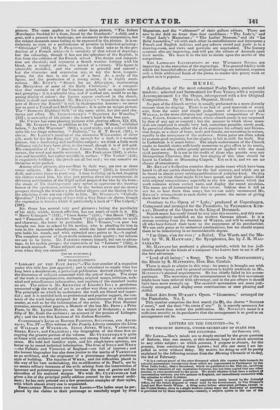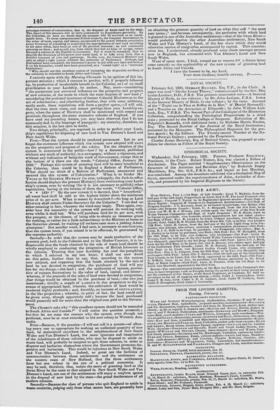LETTERS ON THE COLONIES—No. V.
TO VISCOUNT HOWICK, UNDER-SECRETARY OF STATE FOR
MY Lonn—Men's minds are so deeply excited by the great question of Reform, that one cannot, at this moment, hope for much attention to any other subject: on which account, I propose to abstain, for the present, from continuing these Letters ; but this one more I am im- pelled to write without delay. My motive for doing so will be partly explained by the following extract from the Morning Chronicle of to-day,
the 3rd of February.
"It is a curious proof of the utter disregard which this country feels towards its colonial possessions (except only those which are represented in Parliament by the West India body), that a document, which we published on the 20th ult., involving the deepest interests of our Australian Colonies, has not been copied into any other journal, or even mentioned by the press. We doubt whether it has been a subject oi conversation between any two persons in England, not immediately connected with the colonies to which it relates. "The paper in question consists of regulations lately issued by the Colonial Office, for the future disposal of waste land by the Government, in Van Diemen' Land and New South Wales. A thing never before attempted, perhaps, except in the United States, even in a single modern colony since' the discovery of America" Is provided for by these regulations,--namely, a uniform system in the use of tins
principal element of colonization, that is, the disposal of waste land by the state. The object of this measure will be little understood by Englishmen generally. By the Colonists, we have no doubt that the measure will be received, as an inesti- mable boon. To those unrepresented British subjects, the frequent • fluctuations in the value of land, capital, end labour; occasioned by the power hitherto awarded to every Governor of extending or restricting the appropriation of new land according to his mere whim, have been an evil of the greatest moment ; an evil constantly pressing on them ; and an evil, too, from which they had no hope of escape, unless through a reform of the English Government. For it must be remarked, that to deprive the Governor of his power over waste land, is to take away from him a fruitful vineyard of jobs and patronage. In this case, the Colonial Minister was able to adopt a right course without the authority of Parliament Perhaps, had Parliament been consulted;the Governor's power to job with new land and bestow It on his favourites, would have been preserved, as a vested right' or a ' venerable Institution.'
• " Why should not this excellent system of increasing the disposable territory of the colonists be extended to South Africa and Canada ? "
I entirely agree with the Morning Chronicle in its opinion of this im- portant measure ; which I venture to predict, will, if properly followed up, be productive of incalculable benefit to the Colonies, and of no small gratification to your Lordship, its author. Nay, more—considering the paramount and universal influence on the prosperity and progress of new colonies, of the mode in which the state disposes of new land ;" considering the profound ignorance of former Colonial Ministers as to the art of colonization ; and considering further, that with some additions, easily made, these regulations will form a perfect system,—I will add, that the time must come and sooner perhaps than your Lordship ex- pects, when the name of come, lynx shall be mentioned with respect and gratitude throughout the more extensive colonies of England. If you have read my preceding letters you may have observed, that I do not commonly. deal in the language of panegyric : my sincerity, therefore, on this occasion, is the less open to doubt.
Two things, principally, are required, in order to perfect your Lord- ship's regulations for disposing of new land in Van Diemen's Land. and New South Wales.
First—That the system should be rendered permanent. Let us not
forget the enormous influence which the system now adopted will exert on the prosperity and progress of the colony. Yet the adoption of the system is announced to the public—how ? by a document, published without any mark of authority, in a newspaper, without a signature, and 'without any indication of being the work of Government, except that at the bottom of it there are the words, "Colonial Office, January 20, 1831." Perhaps this system of granting land will be more beneficial to the Colonies, than would be to England a Reform of Parliament. What should we think of a Reform of Parliament, announced and secured like this system of Colonization ? What is to hinder Mr.
Twrss or Sir GEORGE MURRAY (in case, unhappily, the Jack-in-office faction should displace the present Ministry) from overturning your Lord- ship's system, even by writing (for it is not necessary to publish) other regulations, having at the bottom of them the words, "Colonial Office, * * 183* ?" By the new system it is decreed, that " henceforth" all waste land shall be sold to the highest bidder above the minimum price of 5s. per acre. What is meant by henceforth J.—So long as Lord 1:10W/CK shall remain Under-Secretary for the Colonies ? I can find no other meaning in fact, whatever the word may imply. Then again, con. Eider how the insecurity of the system will prevent its working well, even whilst it shall last. Who will purchase land for 5s. per acre, with the prospect, or the chance, of being able to obtain an immense grant for nothing, or rather for a little subserviency to the Minister at home or the Governor abroad, by waiting till we have once more a jobbing Admi- nistration ? Not another word, I feel sure, is necessary to convince you, that the system must, if you intend it to be effectual, be guaranteed by the supreme authority. Secondly—In order that the system may be made productive of the greatest good, both to the Colonies and to the Mother Country, it is in- dispensable that the funds obtained by the sale of waste land should be wholly employed in conducting the emigration of .British labourers to the colonies. Trusting that your Lordship has read the pamphlets to which I referred in my last letter, I shall not now dwell on this point, further than to say, that, according to the system now adopted, and supposing that the funds obtained by the sale of land be not devoted to emigration, the 'purchaser of land will pay but for two things,—the land ; and the uniformity of system, preven. tive of ruinous fluctuations in the value of land, capital, and labour : whereas, if the proceeds of the sales of land were devoted to emigration, four things would be obtained by the purchase of land,—the two just mentioned; thirdly, a supply of LABOUR in due proportion to the in- crease of appropriated land, whereby the cultivation of land would be rendered highly profitable ; and, fourthly, an increase of popular/ ox, in the like proportion ; whereby, in point of fact, the land would still be given away, though apparently sold ; because the land purchased would presently sell for more than the original sum paid to the Govern. went.
The Chronicle asks why "this excellent system should not be extended to South Africa and Canada ?" I will notice the question presently ; but first let me state the reasons why the system, even though not perfected, must be at once extended to the new colony in Western Aus- tralia.
First—Because, if the practice—I will not call it a system—of allow- ing every one to appropriate for nothing an unlimited quantity of new land, be maintained anywhere in the neighbourhood of New South Wales and Van Diemen's Land, the more ignorant and imaginative of the inhabitants of those colonies who may be disposed to settle on waste land, will probably be tempted to quit those colonies, in order to disperse and barbarize themselves where the Government promotes dis- persion and barbarism. This would be injurious to New South Wales and Van Diemen's Land. Indeed, so great are the facilities of communication between those settlements and the settlement on the western coast of New Holland, that the three settlements form but one colony in the eye of a political economist. It May be said, therefore, that, unless the mode of granting land at the :Swan River be the same as that adopted in New South Wales and Van Diemen's Land, not one of the settlements will enjoy a uniform system In the disposal of new land by the state—the grand desideratum of all modern colonies.
Secondly—Because the class of persons who quit England to settle in Waste countries, judging only from what occurs here, are generally bent
on obtaining the greatest quantity of land on what they call "the most easy terms ;" and because, consequently, the profusion with which land is granted in one of the Australian settlements—that of the Swan River— would probably deprive the other Australian settlements' New South Wales and Van Diemen's Land, of the due share which they would otherwise receive of emigration accompanied by capital. This consider- ation has, I understand, already produced some alarm amongst persons now in England, but connected with Van Diemen's Land and New South Wales.
Want of space must, I find, compel me to reserve for a future letter some remarks on the applicability of the new system of granting laud to South Africa and Canada.
I have the honour to be, my Lord, Your most obedient, humble servant, . P—.



























 Previous page
Previous page